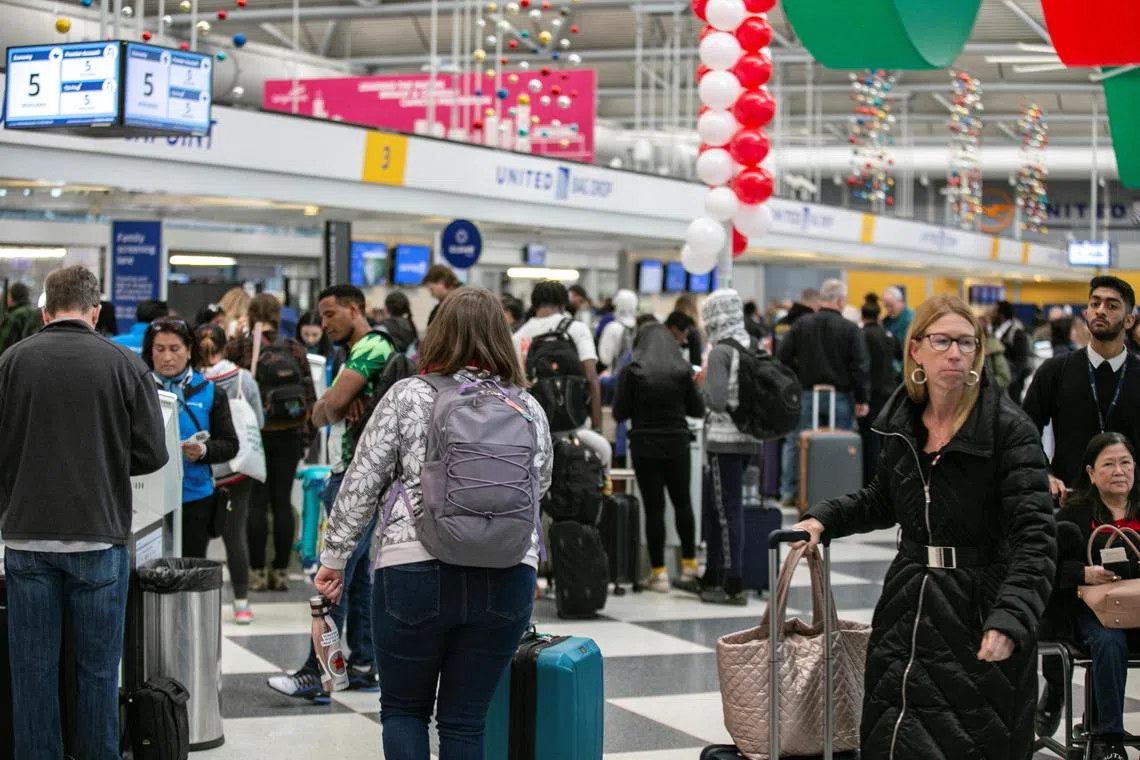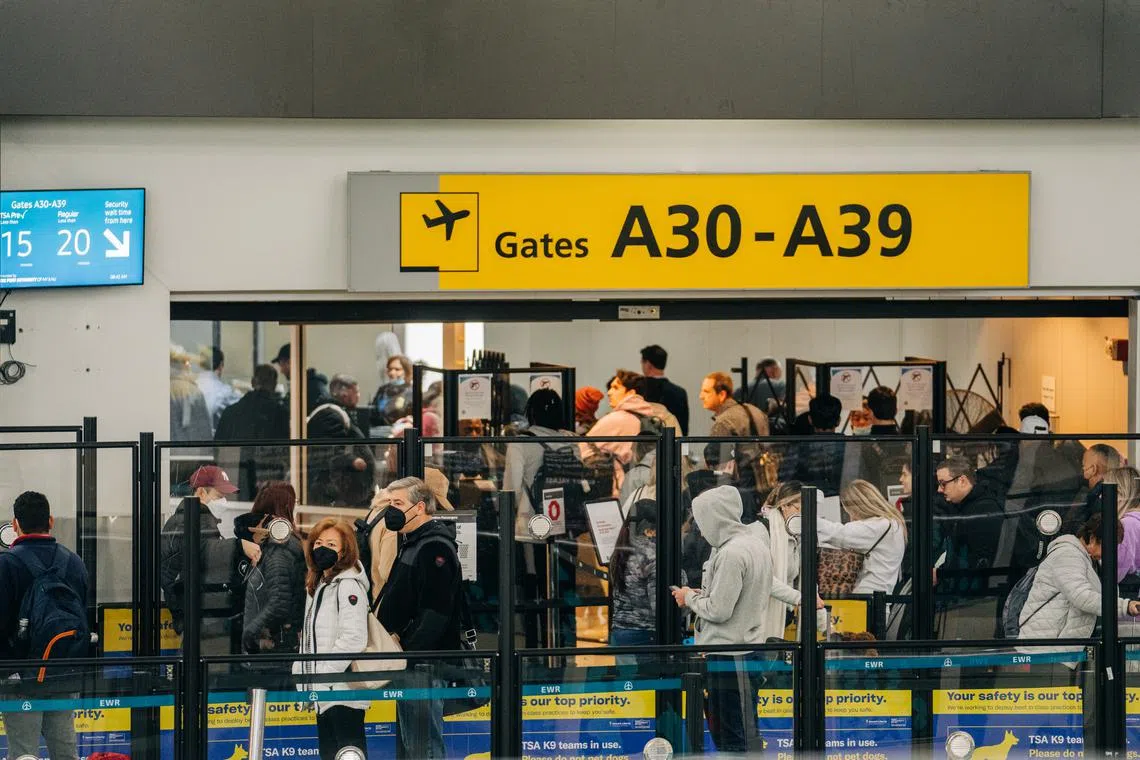Airlines expect US operations to rebound on Thursday as FAA investigates outage
Sign up now: Get ST's newsletters delivered to your inbox

Passengers wait for the resumption of flights at O’Hare International Airport, in Chicago, Illinois, on Jan 11, 2023.
PHOTO: REUTERS
WASHINGTON - US airlines said they expect operations to return to normal on Thursday as the Federal Aviation Administration (FAA) scrambles to pinpoint the cause of a computer outage that grounded flights nationally
However, 511 US flights were delayed and 63 were cancelled as at Thursday early morning, according to FlightAware.
More than 11,300 US flights were delayed or cancelled on Wednesday, in the first national grounding of domestic traffic in about two decades.
Many industry officials compared the grounding to what occurred after the terror attacks on Sept 11, 2001.
Major carriers such as Delta Air Lines, United Airlines and Southwest Airlines said they expected normal operations on Thursday.
The FAA computer failure prevented airports from filing updated safety notices that warn pilots of potential hazards such as runway closures, equipment outages and construction, bringing flights to a temporary halt.
FAA officials said a preliminary review traced the problem to a damaged database file, but added there was no evidence of a cyber attack and the investigation was continuing. The same file corrupted both the main system and its backup, said people familiar with the review, who asked not to be identified.
US Senate Commerce Committee Chair Maria Cantwell, a Democrat, said the panel would investigate. Republican Senator Ted Cruz called the failure “completely unacceptable”.
Mr Arjun Garg, former FAA chief counsel and acting deputy administrator, said that it was premature to draw any conclusions about the event, but that the agency was right to ground flights if a safety system was not operational.
Mr Garg, now a partner at law firm Hogan Lovells, said the incident was a reminder that the FAA was subject to an annual appropriation cycle, making it difficult to plan and execute major multi-year projects such as air traffic control upgrades.
“The health of that agency and its ability to deliver on its mission really is important,” he said in an interview. “It’s a high-profile matter.”
The FAA has been without a permanent administrator since March.
The Senate has not held a hearing on President Joe Biden’s pick to head the agency, Denver International Airport Chief Executive Phil Washington, who was renominated last week.

Travelers wait in security inspection lines at Newark Liberty International Airport in New Jersey, on the morning of Jan 11, 2023.
PHOTO: NYTIMES
The FAA has struggled to modernise some longstanding parts of air traffic control.
A 2021 Transportation Department Office of Inspection General (OIG) report repeatedly cited challenges in the FAA’s multi-billion dollar Next Generation Air Transportation System (Next) infrastructure project.
The OIG said its work “has shown that FAA has struggled to integrate key NextGen technologies and capabilities due to extended programme delays that caused ripple-effect delays with other programmes”.
In October, for example, the FAA said it was working to end a long-ridiculed, decades-old practice of air traffic controllers using paper flight strips to keep track of aircraft.
But adopting the change at 49 major airports will take the FAA until late 2029.
The FAA has also been trying to modernise the Notices to Air Missions system “to improve the delivery of safety critical information to aviation stakeholders”, according to its website. The system provides pilots, flight crews, and other users of US airspace with relevant, timely and accurate safety notices.
Last April, the FAA began investing US$1 billion (S$1.33 billion), out of US$5 billion set aside in the infrastructure package signed into law in 2022, in repairing and replacing key equipment in the air traffic control system, including power systems, navigation and weather equipment, and radar and surveillance systems across the country.
“There’s a great deal of work needed to reduce the backlog of sustainment work, upgrades and replacement of buildings and equipment needed to operate our nation’s airspace safely,” FAA Deputy Administrator Bradley Mims said at the time.
In Florida, a problem with a system used to control air traffic, known as the En Route Automation Modernisation (Eram), prompted the FAA on Jan 2 to issue a ground stop order, slowing traffic into airports and snarling hundreds of flights.
The issue with the Eram system at a major regional air traffic control centre in Miami was behind dozens of flight delays at the Miami International Airport and flights into other airports in the southern US state.
ERAM in 2015 replaced the 40-year-old En Route Host computer and backup system used at 20 FAA Air Route Traffic Control Centers nationwide.
House Transportation Committee chair Sam Graves, a Republican, labelled as “inexcusable” the FAA’s failure to properly maintain and operate the air traffic control system.
The FAA said in 2020 it was more difficult “for the FAA to hire technical talent as quickly and effectively than in the past”. The Department of Transportation, which oversees the FAA, has struggled with information technology.
In 2019, a Government Accountability Office report on federal government IT planning found the DOT was one of three major agencies without a modernisation plan. REUTERS


